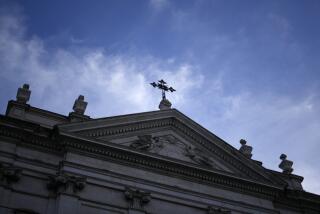Review: ‘The Huston Smith Reader’ surveys a remarkable life
The Huston Smith Reader
Edited with an introduction by Jeffery Paine
University of California Press: 280 pp., $29.95
A restless curiosity about the sacred dimensions of life drove Huston Smith to seek enlightenment in a Zen monastery in Japan, join a secret Muslim fraternity, make pilgrimages to Himalayan holy sites and investigate the religious import of mind-altering plants.
These experiences also propelled Smith through six decades of scholarly analysis that has made him one of the world’s most important writers and thinkers on religions of the world.
Today a new aspect of life absorbs the grand old man of comparative religion. Now living in a room in an assisted-living facility, the 93-year-old Smith has found himself making new friends in a community of senior citizens “in wheelchairs or depressed or withAlzheimer’s.” There too he ponders this question: What happens when we die?
FOR THE RECORD
Huston Smith: A June 24 Arts & Books review of “The Huston Smith Reader” said that Huston Smith was residing in an assisted-living facility. In fact, Smith returned home after the book went into production, which was not noted in the book.
His 15th book, “The Huston Smith Reader,” is a great summing up of Smith’s work over the last half-century, from passionate lectures and essays on why religion matters to deeply personal reflections on entering his ninth decade of life.
Taken together, these works offer a portrait of the author who, to describe the world’s enduring faiths as accurately as possible, immersed himself in them, participating in their rituals and practices to get, as he put it, “an insider’s view.”
What is missing is only Huston’s classic, “The World’s Religions,” an introductory college textbook that has sold more than 3 million copies. With few exceptions, the selections are eloquent and filled with anecdotes, character sketches and tales of wonder involving Masai warriors who rescued him from lions, a Japanese spiritual leader who confided the true meaning of Zen Buddhism, and Smith’s own parents, evangelical Christians from whom he inherited an abiding trust in God.
In the 1950s, professor S.H. Nasr in Iran provided Smith with an insight that became an inspiring beacon over his long academic career: “Don’t search for a single essence that pervades the world’s religions. Recognize them as multiple expressions of the Absolute, which is indescribable.”
It has been a remarkable life.
Born in 1919, Smith was raised by missionary parents in Suzhou, China, and would go on to teach religion at the Massachusetts Institute of Technology and UC Berkeley. An ordained Methodist minister, Smith apprenticed with some of the wisest spiritual leaders in various traditions, including Christianity, Hinduism, Sufism and Tibetan and Zen Buddhism. In the process, he also crossed paths with such 20th century religious and cultural figures as Aldous Huxley, the Dalai Lama and Timothy Leary.
Smith, in his 40s at the time, was reclining on a couch in Leary’s living room onNew Year’s Day1961, humbled by the profundity of a mescaline-inspired realization that “no man can see God and live — the sight would be too much for the body to withstand, like plugging a toaster into a power line.”
Smith already held 12 honorary degrees when he rose to national attention in 1996 after being featured in Bill Moyers’ five-part PBS series, “The Wisdom of Faith with Huston Smith.”
Smith’s 2001 book, “Why Religion Matters,” won the Wilbur Award for the best book on religion. Since the terrorist attacks of Sept. 11, 2001, Smith has tried to promote what he says is the genuine message of Islam, a tradition he describes as “a Mecca of order, meaning, beauty and understanding.”
It is unfortunate, he argues in the chapter “My Three Religions,” that “when my countrymen look to the Middle East (especially since9/11) they often look with eyes of fear and foreboding. In the West today, no religion is more misunderstood than Islam; on both sides religion has gotten hijacked by politics. When I think how the Islam I saw by the light of spirituality is now obscured by the dark of ideology, my heart becomes heavy indeed.”
In “The Way Things Are,” an interview first published in 2006, Smith describes his urgent search to find spiritual meaning in the death of his oldest daughter, Karen, who succumbed to sarcoma. In the interview conducted 18 months after Karen’s death, Smith said, “At the center of the religious life is a peculiar kind of joy, the prospect of a happy ending that blossoms from necessarily painful ordeals, the promise of human difficulties embraced and overcome.”
Smith has resided in an assisted living facility apart from Kendra, his wife of 65 years, for nearly a decade. “My increasing physical needs were taking a toll on her health; hence the move,” he acknowledges in “Reflections on Turning 90.”
But he continues to pray in accordance with a simple formula.
First, he takes stock of how well his day is going. “If it’s going well, you should accent the first phrase, ‘Thee do we worship,’ and pour out your gratitude like Niagara Falls,” he says. “If, on the other hand, it is one of those days when you wonder how you are going to get through it, you ask for help: ‘Thee do we ask for aid.’ Swallow your pride and admit that we all need help at times.”
More to Read
The biggest entertainment stories
Get our big stories about Hollywood, film, television, music, arts, culture and more right in your inbox as soon as they publish.
You may occasionally receive promotional content from the Los Angeles Times.







